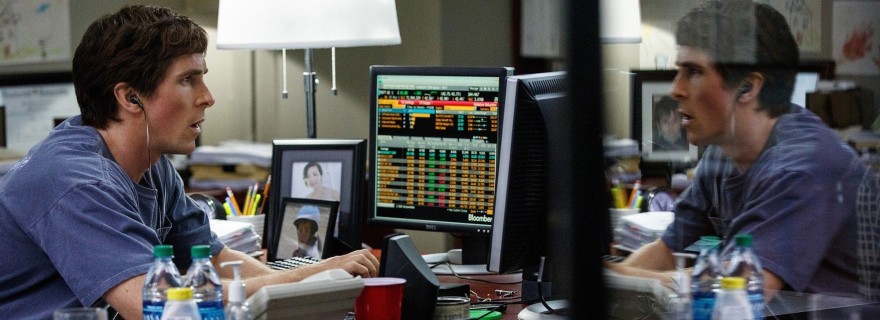'The Big Short'
Movie Rating:
3.5
If one were to write a list of the filmmakers most likely to cover the great financial collapse of 2008, writer/director Adam McKay wouldn’t even be in the running. We’re talking about the man behind ‘Anchorman’ and ‘Step Brothers’. Those are excellent absurdist comedies and feature a surprising intelligence beneath their delightful stupidity, but that wouldn’t necessarily suggest McKay could sum up the mortgage crisis in a gut-punch prestige picture – especially since his attempts to cram commentary about the issue into his buddy cop comedy ‘The Other Guys’ was awkward at best.
However, it’s precisely the fact that McKay’s tone is so oddly suited to the material that makes ‘The Big Short’ such a wonderful awards season surprise. The director hasn’t abandoned his wildest comedic tendencies to make a sad clown bit of Oscar bait. Instead, he’s made an honest and uncomfortable drama about the horrible slice of U.S. history that’s sweetened by his gifts for oddball comedic digressions.
The strange story starts with its strangest man. Christian Bale plays Michael Burry, a heavy metal loving PHD candidate with a variety of mental health issues. He was also a financial and mathematical genius who foresaw the collapse of the housing market years in advance. The details are explained, but McKay knows it’s not easy to sit through that sort of thing, so he hilariously describes all the scams and bad economics behind the story through surreal cutaways in which Margot Robbie in a bathtub or Anthony Bourdain filleting fish dole out the vital info.
The important detail is that when Burry foresaw the collapse, he found a way to bet on it. Financial institutions were more than happy to take his crazy bet since they couldn’t imagine the housing market crashing. Ryan Gosling narrates as Jared Vennett, a sleazeball in a suit who overheard Burry’s pitch and spread it to a hedge fund manager (Steve Carell) just cynical enough to believe in the cause. On top of that, a pair of small time kids looking to get into the game (John Magaro and Finn Wittrock) also stumbled onto the plan and hopped on board with the help of their Yoda-esque retired financial guru neighbor (Brad Pitt). Together, these teams of oddballs and outcasts beat the system by betting on greed and made billions off a tragedy.
So, it’s a strange story – strange enough that it had to be true, and one that was fascinating for Adam McKay of all people to tell. It’s deeply satirical, cynical stuff, but also the sort of thing that could have easily been tossed off as po-faced drama not nearly as effectively as ‘The Big Short’. What McKay ingeniously did was tell this strange, spiraling story in the ramshackle style of his contemporary comedies. There’s a delicious irony to this tale. Our heroes might have caught the corruption, but since they knew it was impossible to fix the problem in the irrational world of filthy finance, they embraced their own special brand of dirty pool instead. It’s ugly stuff, but ugly stuff that’s harshest to the real unseen villains who laid the tracks. The movie’s protagonists are at least acting slimy on the right side of a moral cause.
The performances are delightful, topped by Bale’s straight-laced nut who earns laughs through a mixture of mathematic genius and complete social ineptitude. Gosling puts his onscreen charisma to the ultimate test by playing the arguably the most reprehensible character who is also an amusing narrator. Steve Carell continues his unexpected transition into drama by playing a mess of a man whose lifetime spent loathing his bosses and colleagues finally pays off. The crew are all wonderfully strange, crafted well by McKay’s script and beautifully portrayed by a number of famous faces.
The only real problem is that McKay balks slightly in letting his characters come off as the lesser of competing evils. Too often he cuts away from his absurdist economic narrative to provide humanizing back story for several characters that feels completely tacked on. Other characters remain frustratingly opaque (particularly the one played by Brad Pitt, who needs that movie star presence to have any human presence at all). ‘The Big Short’ spirals off into so many strange directions at once that it’s almost inevitable that some of them are dead ends. That’s the film’s biggest weakness and strength.
If nothing else, you have to give Adam McKay and company credit for delivering a completely unique movie within the Hollywood system. Martin Scorsese might have made a masterpiece about corporate crime in ‘The Wolf of Wall Street’, but there needed to be a movie specifically about the 2008 mortgage crisis because it was such a disgusting event that white collar criminals got away with thanks to their scams being too confusing for most folks to grasp. McKay has made a movie just as strange, frustrating, funny and tragic as his subject. That he did so through satire and absurdism is both an unexpected treat and appropriate to the insanity of the topic.
‘The Big Short’ sputters around in the midst of all its grand comedic experiments and quite often proves to be frustrating. However, the pleasures of the film run deep and its importance as a cultural artifact is huge. If nothing else, there’s certainly never been another movie quite like ‘The Big Short’. But if the financial world continues down the self-destructive path it’s on, there might have to be another.



